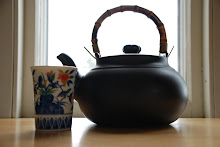
I saw the banana tree of my childhood when I went back to Vietnam for a visit. It stood tall and shading along the walkway leading to the house where I once lived. The sky-blue gate was still there, creaky but secure. It opened noisily on its hinges, chains rattling, onto the leafy path that did not seem quite so winding as I remembered it to be. The low-lying shrubs flanking the pathway were now replaced by large, ornate planters. But the banana tree, with its lush canopy, was where it should be, venerably bent over all other greenery as you neared the main house. Peering up, you saw the fruit, unattainable and clustered, on the bisected trunk.
The banana tree stood sentinel over my childhood games. Pedaling my little bike down the path that stretched on forever, coaxing my little sister to race me to the house, or rollerskating headlong over treacherous cracks; my world abounded with possibilities.
I walked on the path decades later, noting the changes around me. My adult's eye tried to drink them in: a well-used moped propped against a tree, the blue gate with its new coat of paint, the banana tree with its fronds and its fruit, a little less imposing that it once had been.
Now, I sat down for my late morning cup of tea. A banana bread was in the oven, transmuting the cloying scent of the overripe into a warming aroma of baking. This was serendipity, in the form of four bananas riddled with black splotches that had sat on our counter a little too long.

These bananas differed from those of my childhood. The ones I remembered were smaller and sweeter - I could easily eat half a dozen of them at a time. That enthusiasm soured when we moved to the States and I bit into my first Chiquita-labelled banana. My disappointment was great as I realized how insipid it tasted. Since then, only bananas past their prime - the substrate for a loaf of banana bread - could redeem themselves for me.
I chose a new tea, a Chinese black from Yunnan. As I waited for the tea to brew, I cut slices of the bread, barely out of the oven.
The tea lacked the satisfying depth of Keemun, my favorite black. I kept hoping for an unexpected heft of complexity to emerge, but I didn't find it. The banana bread, however, was airy, its tops like a souffle, imbuing some magic again to my childhood memories.
Baking notes: I used much less sugar than the recipe called for, omitted the chocolate altogether, and substituted 1/4 of the all-purpose flour with almond flour.





3 comments:
How dear to our hearts are the things of our childhood. I still visit the house I grew up in, the land, my grandparents homes, and remember the good things from those days.
I share your fondness for finger bananas. In the Lower Keys I raise a Indian variety called Raja Puri. This is a sub-acid banana. Think of the tartness of an apricot combined with the taste of a banana. I compete with the local Key deer for them.
Your local deer has good taste:)
Post a Comment